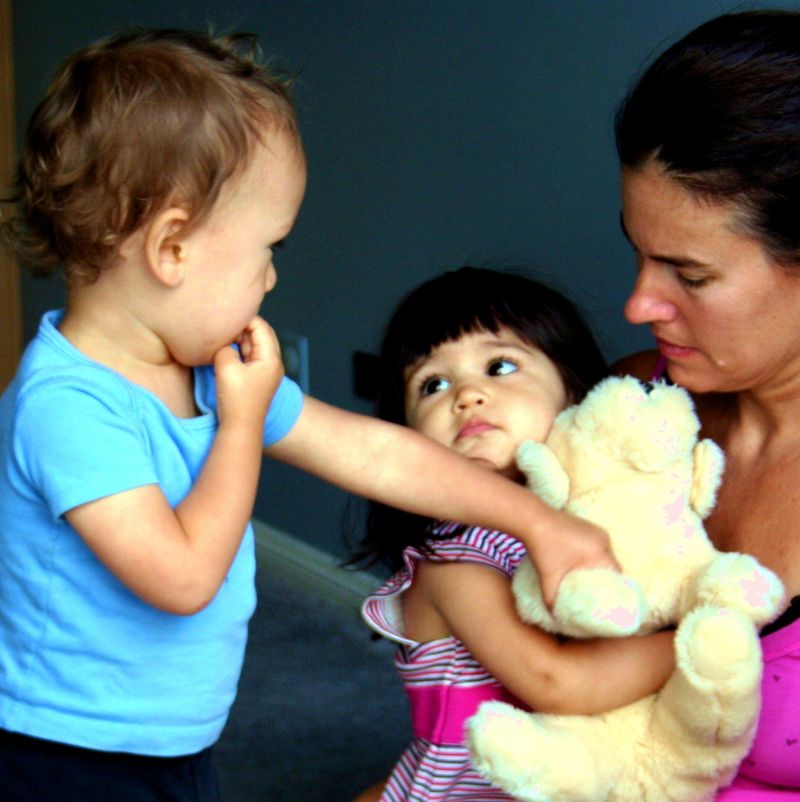Parenting can be challenging, especially when faced with the peculiar demands of children who often exhibit selfish behavior. Here are ten phrases that parents commonly hear from their self-focused little ones. These expressions reveal a lot about the mindset of children who are still learning the importance of sharing and empathy. This blog post explores these phrases in detail, providing insights and potential solutions for dealing with them effectively.
1. “That’s mine!”

In the world of children, possession is a powerful concept. “That’s mine!” is a phrase that echoes through homes where sharing isn’t yet second nature. It marks the beginning of a territorial claim over toys, games, or even a parent’s attention.
Understanding this phrase requires patience, as young minds equate ownership with security. Many parents find themselves in a constant negotiation, gently encouraging their kids to share and consider others’ feelings.
A playful approach, using games that involve taking turns, often helps in softening this possessive attitude, teaching kids the joy of sharing.
2. “I want it now!”

“I want it now!” is a common demand in the age of instant gratification. Today’s children grow up in a fast-paced world where waiting feels like an eternity. This phrase often tests a parent’s capacity to instill patience.
Teaching children to wait is crucial. Using timers or visual countdowns can help them understand the concept of time and anticipation. These tools transform waiting from a frustrating experience into a learning opportunity.
Parents might also find success in explaining the value of earning rewards over time, encouraging a sense of achievement when patience pays off.
3. “Why can’t I have it?”

Curiosity fuels the question, “Why can’t I have it?” It’s a hallmark of a developing mind pushing boundaries and seeking understanding.
This phrase can open the door to valuable conversations about needs versus wants. Parents have an opportunity to teach decision-making by explaining financial limits or health considerations.
By turning these situations into discussions, parents encourage kids to think critically about their desires. Providing alternative choices can also redirect their focus and teach them to appreciate what they have, nurturing a content and thoughtful attitude.
4. “You never let me do anything!”

“You never let me do anything!” is a phrase that resonates with frustration and a desire for autonomy. It surfaces when children feel constrained by rules they don’t understand.
Addressing this requires empathy and clarity. Explaining the reasons behind rules helps children see them as protective rather than punitive. Creating small, safe opportunities for independence can alleviate this feeling.
Parents who engage their kids in setting personal goals or tasks often find a positive shift. This sense of empowerment, coupled with gradual responsibility, fosters confidence and reduces rebellious outbursts.
5. “That’s not fair!”

Fairness is a concept children grapple with daily. “That’s not fair!” reflects their emerging sense of justice and equity. This phrase often arises in sibling dynamics or competitive scenarios.
Parents can address it by fostering open dialogue about fairness, explaining that equality doesn’t always mean identical treatment. Empathy exercises, like discussing others’ perspectives, can broaden their understanding.
By involving kids in problem-solving, parents teach them to negotiate and compromise, skills essential for harmonious relationships. Over time, children learn that life’s complexities often defy simple fairness, instilling resilience.
6. “I don’t care!”

“I don’t care!” can surface in moments of defiance or when children feel overwhelmed. It’s often a protective barrier against vulnerability.
This phrase challenges parents to dig deeper, uncovering underlying emotions like fear, frustration, or sadness. Responding with understanding, rather than confrontation, opens lines of communication.
Encouraging a child to express what they do care about, and validating those feelings, can turn apathy into engagement. By creating a safe space for honest expression, parents guide children towards emotional awareness and healthier responses to stress.
7. “You promised!”

Promises hold powerful sway in a child’s world. “You promised!” highlights unmet expectations and the importance of trustworthiness.
When parents inadvertently break promises, it can feel like a breach of security to a child. Transparent communication about changing circumstances is crucial to maintaining trust.
By modeling accountability and honesty, parents teach their children about the complexities of commitments. This understanding is vital in helping kids learn to manage their own promises, fostering a sense of reliability and maturity as they grow.
8. “It’s not my fault!”

“It’s not my fault!” is often a reflexive defense mechanism for children avoiding blame. It can signify fear of reprimand or a lack of accountability.
To shift this mindset, parents can focus on teaching responsibility. Discussing the importance of owning up to actions, even when mistakes are made, is key. Role-playing scenarios can help them practice admitting faults in a safe environment.
Fostering a culture where mistakes are seen as learning opportunities, not failures, encourages children to be honest and accountable, building integrity and self-awareness.
9. “I don’t want to!”

“I don’t want to!” is typical of young children asserting their will. It’s a clash between personal desires and external expectations.
Understanding this phrase involves recognizing a child’s need for autonomy. Offering choices within boundaries helps them feel empowered while respecting necessary limits.
Parents can encourage cooperation by explaining the benefits of certain activities. Inviting input and making tasks fun transforms resistance into willingness, nurturing a cooperative spirit and understanding of compromise.
10. “Everyone else has it!”

Social comparison drives the assertion, “Everyone else has it!” It’s fueled by peer pressure and the need to fit in.
This phrase offers parents a chance to discuss individuality and values. Highlighting family priorities and decision-making processes helps children understand that differences are okay.
By focusing on personal strengths and unique qualities, parents can counteract the allure of conforming to peers. Encouraging gratitude for what they have, and setting boundaries on peer influence, promotes self-esteem and independent thinking.

Mother of three and a primary school teacher. I’ve always loved being around children and helping them, so I chose my path as a teacher. It is sometimes hectic with three children, but I am 100 percent into it and wouldn’t change it for anything in the world.

